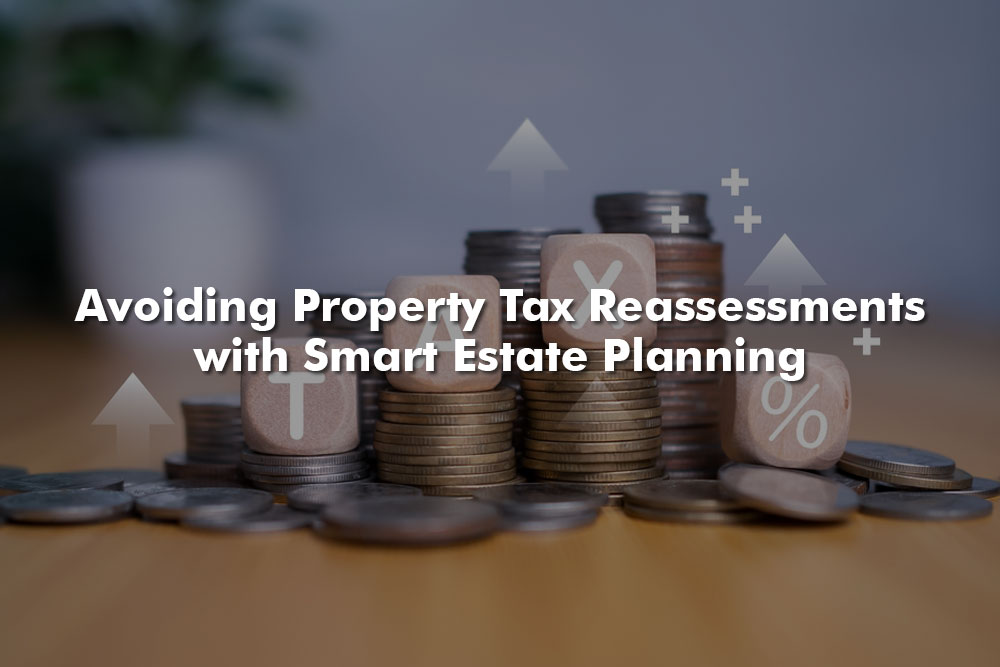In California, property ownership comes with a valuable benefit—Prop 13 protections that limit property tax increases. But without smart estate planning, your beneficiaries could lose these protections due to property tax reassessments when the property is transferred. For many families, this leads to higher taxes and the forced sale of cherished family homes or income properties. Fortunately, with the right strategies, you can avoid these costly outcomes.
How property tax reassessments work in California, what causes them, and how thoughtful estate planning can help you legally avoid reassessments and protect your legacy.
What Is a Property Tax Reassessment?
Under California law, properties are generally taxed based on their assessed value, which is set when the property is purchased and then increased by a limited percentage each year (usually capped at 2% annually, thanks to Proposition 13). However, when a property changes ownership, the county tax assessor reassesses the property at current market value. This can cause a significant increase in the property tax bill.
For example, a home bought in 1995 for $250,000 may have an assessed value of $350,000 today—but if reassessed upon transfer, and the market value is now $1.5 million, the new property tax bill could triple or more.
Common Events That Trigger Reassessments
Property tax reassessments in California are typically triggered by a change in ownership or certain types of transfers. Events that often lead to reassessment include:
- Gifting real estate to children without proper planning
- Transferring property into a trust without exemptions in place
- Selling or transferring property between siblings or to non-relatives
- Inheriting property and failing to file for exclusions in time
Even transfers involving a revocable living trust or a will can result in reassessment if the structure isn’t set up correctly.
Key Laws That Help Prevent Reassessment
Two major California laws help avoid property tax reassessment during transfers:
Proposition 13 (1978)
Limits annual increases in assessed value to no more than 2% unless there’s a change in ownership or new construction.
Proposition 19 (2020)
Replaced the earlier Proposition 58 and significantly limited the parent-to-child exclusion for property tax reassessments. Under Prop 19:
- The family home can be excluded from reassessment if the child makes it their primary residence within one year and files for the exclusion.
- The exclusion is capped at $1 million of additional market value over the existing assessed value.
- Rental and investment properties are no longer excluded under parent-to-child transfers.
This has major implications for families looking to pass on income-generating property or second homes.
Smart Estate Planning Strategies to Avoid Reassessment
Working with an experienced estate planning attorney can help you use legal tools to avoid or minimize reassessment. Here are some of the most effective strategies:
1. Use of Legal Entities (LLCs or LPs)
Transferring real estate into a Limited Liability Company (LLC) or Limited Partnership (LP) can offer asset protection and potential tax advantages. In certain cases, if structured carefully, it may allow for ownership changes without triggering reassessment, since the property itself is not directly changing hands—just membership interest in the entity.
However, this approach is complex and must be done with precision to comply with the California Revenue and Taxation Code. It’s not a blanket exemption and improper structuring can backfire.
2. Proper Use of Trusts
Using the right kind of trust is critical:
- Revocable Living Trusts avoid probate but won’t avoid reassessment unless paired with the correct exclusions.
- Irrevocable Trusts can help in certain cases, but once assets are transferred, they are no longer controlled by the original owner.
- Intentionally Defective Grantor Trusts (IDGTs) and other advanced strategies can be used to maintain some control while planning for future tax savings.
Your trust should be customized based on your property portfolio and goals, especially if you want to pass on rental or vacation homes.
3. Timely Filing of Exclusion Forms
When transferring the family home under Proposition 19’s parent-to-child exclusion, your heirs must:
- Move into the home within one year
- File a Claim for Reassessment Exclusion for Transfer Between Parent and Child (BOE-19-P) with the County Assessor
Missing the filing window could automatically trigger reassessment. Your estate plan should include clear instructions for your heirs to take timely action.
4. Gifting Strategy Over Time
Gifting fractional interests over time, especially when using legal entities, can sometimes help reduce exposure to reassessment. However, this strategy is highly nuanced and should only be considered with the guidance of both an estate attorney and tax advisor.
5. Smart Planning for Income Properties
With Proposition 19’s limitations, income properties like rental units or vacation homes can no longer be transferred without reassessment. But you can still reduce the tax impact through:
- Strategic use of 1031 exchanges prior to death
- Freezing value via installment sales to irrevocable trusts
- Establishing family LLCs or LPs for long-term asset protection and tax flexibility
These advanced techniques should only be implemented as part of a broader estate and tax plan.
Why This Matters More Than Ever in California
With soaring real estate values in places like San Diego, families are at greater risk of losing valuable tax advantages when properties are transferred. A smart estate plan is no longer just about who gets what—it’s about preserving value, minimizing tax exposure, and keeping properties in the family.
Whether you have a single family home, a portfolio of rental properties, or commercial assets, protecting your Prop 13 base year value can make a million-dollar difference for your heirs.
How We Can Help
At Allenby Law, we specialize in estate planning that goes beyond basic documents. We help San Diego families protect their real estate assets using smart, legally-sound strategies that take today’s changing laws into account.
We’ll sit down with you to:
- Evaluate which of your properties could trigger reassessment
- Customize trust and entity structures for maximum protection
- Preserve Prop 13 benefits for your loved ones
- Ensure your heirs know exactly what to do when the time comes
We simplify the estate planning process—so you can gain peace of mind knowing your property and your legacy are protected.
Let’s make estate planning smarter. Reach out to Allenby Law today for a personalized consultation.



